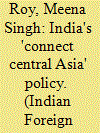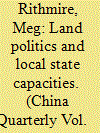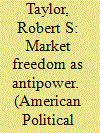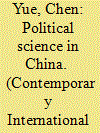|
|
|
Sort Order |
|
|
|
Items / Page
|
|
|
|
|
|
|
| Srl | Item |
| 1 |
ID:
085676


|
|
|
|
|
| Publication |
2008.
|
| Summary/Abstract |
Crises and interventions often generate opportunities for profitable business activities. This can have a significant effect on the outcomes of interventions. This article explores how economic interests can create crises and how the nature of interventions may be shaped by business interests. It looks further at the macroeconomic consequences of crises, the possibilities of corruption and neo-imperialism. Reference is made to examples of crises and interventions that illustrate these political economic concerns.
|
|
|
|
|
|
|
|
|
|
|
|
|
|
|
|
| 2 |
ID:
126548


|
|
|
|
|
| Publication |
2013.
|
| Summary/Abstract |
Political scientists have examined how domestic politics and the competition for international capital affect the setting of national tax rates. In this paper, I explore how political institutions, specifically the level of democracy, affect firm-level taxation across the world. I argue that electoral competition leads democratic governments to higher levels of taxation of firms. Using a data set on firm tax payments on the foreign affiliates of US multinational corporations from the US Bureau of Economic Analysis, I show that there are large variations within countries on the tax burdens faced by firms that are not explained by national tax rates. I find evidence that the mobility of the specific investment project, the types of spillovers these investments provide to a community, and attributes of the parent firm are all important determinants of taxation. While firm-level factors clearly affect corporate taxation, I argue that democratic institutions limit the offering of tax incentives and generate electoral benefits to policing tax avoidance by multinational corporations. After controlling for parent firm and foreign affiliate-level factors, I find that democratic countries generate as much as 26% more tax revenues from multinational corporations relative to authoritarian countries.
|
|
|
|
|
|
|
|
|
|
|
|
|
|
|
|
| 3 |
ID:
124209


|
|
|
|
|
| Publication |
2013.
|
| Summary/Abstract |
In 2001 Argentina defaulted on its debts and then devalued its currency by abandoning the peso-dollar peg. The economy rebounded and has grown relatively strongly since then. This paper uses a critical political economy approach to first show that the Argentinian strategy finds support in the literature examining the effects of sovereign debt default, currency devaluation and fiscal consolidation on economic growth. Argentina is thus relevant to Europe's ongoing crisis. The article then investigates European media coverage of the Argentinian experience through an examination of major newspapers' stories between 2008 and 2013. It argues that the media have distorted the lessons of the Argentinian recovery by focusing on the negative consequences of default rather than its benefits; by emphasising the role of rising commodity export prices over domestic policy decisions in stimulating the economy; by opposing some aspects of government intervention in the economy even if the latter played a beneficial role; and by exaggerating the negative consequences of inflation. This distorted coverage is explained through reference to the media's ideological role in the implementation of austerity policies in Europe.
|
|
|
|
|
|
|
|
|
|
|
|
|
|
|
|
| 4 |
ID:
125079


|
|
|
|
|
| Publication |
2013.
|
| Summary/Abstract |
This article addresses conceptually the European Union (EU)'s security actorness, explaining its meaning, identifying the factors that are constitutive to the concept, and analyzing whether the EU is a security actor in Georgia, through its increased presence and engagement in the country and its eventual implications for the South Caucasus. The article argues that the complementary nature of the different EU tools deployed on the ground and their comprehensive nature have contributed to the EU's consolidation as a security actor in the South Caucasus. However, and despite the successful assessments of the European Union Monitoring Mission in the context of common security and defense policy development, the mission's deployment and its contribution to regional stability are influenced to a great extent by the role and involvement of external players, in particular in this case, that of Russia
|
|
|
|
|
|
|
|
|
|
|
|
|
|
|
|
| 5 |
ID:
127832


|
|
|
|
|
| Publication |
2013.
|
| Summary/Abstract |
Federalist democracies often hold concurrent elections for multiple offices. A potential consequence of simultaneously voting for multiple offices that vary with respect to scope and scale is that the personal appeal of candidates in a high-profile race may affect electoral outcomes in less salient races. In this article I estimate the magnitude of such coattail effects from governors onto other concurrently elected statewide executive officers using a unique dataset of county election returns for all statewide executive office elections in the United States from 1987 to 2010. I exploit the disproportionate support that candidates receive from geographically proximate voters, which is often referred to as the friends-and-neighbors vote, to isolate variation in the personal appeal of candidates. I find that a one-percentage-point increase in the personal vote received by a gubernatorial candidate increases the vote share of their party's secretary of state and attorney general candidates by 0.1 to 0.2 percentage points. In contrast, personal votes for a secretary of state or attorney general candidate have no effect on the performance of their party's gubernatorial candidate or other down-ballot candidates
|
|
|
|
|
|
|
|
|
|
|
|
|
|
|
|
| 6 |
ID:
124218


|
|
|
|
|
| Publication |
2013.
|
| Summary/Abstract |
Alexis Tsipras, the leader of [Greece's] opposition Syriza party, said last week that his country was becoming a 'debt colony'. A couple of days later, Hernán Lorenzino, Argentina's economy minister, used the term 'judicial colonialism' to denounce the US court ruling that his country has to pay in full a group of 'vulture funds' that had held out from the debt restructuring that followed the country's 2002 default.
|
|
|
|
|
|
|
|
|
|
|
|
|
|
|
|
| 7 |
ID:
124886


|
|
|
|
|
| Publication |
2013.
|
| Summary/Abstract |
During the past few years, New Delhi has stepped up its engagement with the Central Asian Republics with the aim of building a long term partnership - both bilaterally and collectively under the frame work of newly pronounced 'Connect Central Asia' policy.
The 'Connect Central Asia' policy is based on pro-active political, economic, cultural and people-to-people engagement with the countries of Central Asian region. At present the South, Central and West Asian region is exposed to completely new set of challenges. These new developments make a case for India to evolve a calibrated and co-ordinated response in its engagement with the regional countries to further secure India's core national interests. It is in this context that present article attempts to examine and evaluate various facets of India's 'Connect Central Asia' policy.
|
|
|
|
|
|
|
|
|
|
|
|
|
|
|
|
| 8 |
ID:
124891


|
|
|
|
|
| Publication |
2013.
|
| Summary/Abstract |
Despite common national institutions and incentives to remake urban landscapes to anchor growth, generate land-lease revenues and display a capacious administration, Chinese urban governments exhibit varying levels of control over land. This article uses a paired comparison of Dalian and Harbin in China's north-east to link differences in local political economies to land politics. Dalian, benefiting from early access to foreign capital, consolidated its control over urban territory through the designation of a development zone, which realigned local economic interests and introduced dual pressures for enterprises to restructure and relocate. Harbin, facing capital shortages, distributed urban territory to assuage the losers of reform and promote economic growth. The findings suggest that 1) growth strategies, and the territorial politics they produce, are products of the post-Mao urban hierarchy rather than of socialist legacies, and 2), perhaps surprisingly, local governments exercise the greatest control over urban land in cities that adopted market reforms earliest.
|
|
|
|
|
|
|
|
|
|
|
|
|
|
|
|
| 9 |
ID:
144609


|
|
|
|
|
| Summary/Abstract |
At a debate [1]among the Republican presidential candidates in March, U.S. Senator Ted Cruz of Texas boiled down his campaign message to its essentials: “Here’s my philosophy. The less government, the more freedom. The fewer bureaucrats, the more prosperity. And there are bureaucrats in Washington right now who are killing jobs and I’ll tell you, I know who they are. I will find them and I will fire them.”
|
|
|
|
|
|
|
|
|
|
|
|
|
|
|
|
| 10 |
ID:
127818


|
|
|
|
|
| Publication |
2013.
|
| Summary/Abstract |
Historically, republicans were of different minds about markets: some, such as Rousseau, reviled them, while others, like Adam Smith, praised them. The recent republican resurgence has revived this issue. Classical liberals such as Gerald Gaus contend that neorepublicanism is inherently hostile to markets, while neorepublicans like Richard Dagger and Philip Pettit reject this characterization-though with less enthusiasm than one might expect. I argue here that the right republican attitude toward competitive markets is celebratory rather than acquiescent and that republicanism demands such markets for the same reason it requires the rule of law: because both are essential institutions for protecting individuals from arbitrary interference. I reveal how competition restrains-and in the limit, even eradicates-market power and thereby helps us realize "market freedom," i.e., freedom as nondomination in the context of economic exchange. Finally, I show that such freedom necessitates "Anglo-Nordic" economic policies
|
|
|
|
|
|
|
|
|
|
|
|
|
|
|
|
| 11 |
ID:
094805


|
|
|
| 12 |
ID:
124984


|
|
|
|
|
| Publication |
2013.
|
| Summary/Abstract |
In order to explain why successes of economic sanctions predominantly occur in the first two years of a sanction episode, we analyse the dynamic economic and political impact of an economic sanction. Our theoretical analysis of the dynamics of adjustment gives us two important results: firstly, the strongest impact in terms of utility forgone occurs in the initial phase of the sanction episode and, secondly, the long-term gain of compliance decreases during a sanction episode and is lower in the long run than acknowledged by the usual comparative static analysis. On both accounts we expect that sanctions have a higher probability of success in the early phase and a lower probability of success in the long run. Next we build a comprehensive set of vector autoregressive (VAR) models that we apply to the case of a boycott of Iranian oil. An important innovation is that we include both economic and political factors in a VAR model of economic sanctions. Our VAR models find significant impacts of economic sanctions both on key economic variables (government consumption, imports, investment, income) and on two indicators of the political system (the Polity variable that describes shifts in the autocracy-democracy dimension and the Vanhanen Index of Democratization that describes political competition and participation). The impact of an oil boycott on the Iranian economy is considerable: oil and gas rents are important drivers of the Iranian key macroeconomic variables and ultimately of its political system. A reduction of oil and gas rents creates economic costs that act as incentives to move towards a more democratic setting. However, this effect is only significant in the first two years and turns negative after six to seven years, as adjustment of economic structures mitigates the economic and political impact of the sanctions.
|
|
|
|
|
|
|
|
|
|
|
|
|
|
|
|
|
|
|
|
|